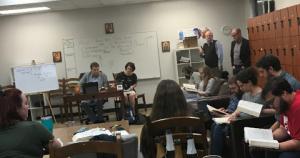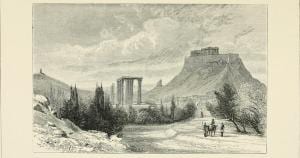 Discussion. The dialectic. The Socratic Method. The Way of Jesus.
Discussion. The dialectic. The Socratic Method. The Way of Jesus.
Call it what you wish, but conversation about a good book is long, can be tedious, and appears inefficient. We can go in circles and that can be frustrating.
That is how discussion seems, because we do, often, go in circles. If you pick a text that is wonderful, then wandering while you wonder what it means is a natural result This is a waste, if the goal is simply knowing what the “consensus of scholarship” on the passage is. I can deliver a (fairly) entertaining lecture that can get more data out in a few minutes than a discussion can generate in three hours. Many others, you can be sure, can do even better. The Internet will sell you information, you can even buy a degree, but wisdom takes time.
Of course, time is money and a horrible thing about grinding poverty is the inability to take time for the important things. If there is one privilege I would spread, it is the ability to take time: to read, discuss, meditate on ideas. Few things are as vital to a citizen. Why?
Data delivery? That can be put commodified and encoded for multiple means of transmission: the faster the better. Wisdom takes time, even “wasted time” as we learn to learn for ourselves. This is not “for a job,” though it will make us more fit to hold one, but to become whole. A community that talks, thinks, wrestles with each other will find wisdom.
Why?
We are created in the image of God. God is real. The cosmos has God’s design shot through it. By the grace of God, we can see a bit of the goodness, truth, and beauty, as we work on the text. This is not salvation from damnation, a different and even more important task, but it is the pursuit of Wisdom, too often left crying out with nobody listening.
We don’t have the time, we think, but we have time for video, our phone application, social media: anything, but wisdom.
 Plato paints the picture of an ideal moment when he has the young Phaedrus meet Socrates outside the city. Phaedrus has heard a wretched speech, but he thinks it is beautiful. He has it with him and is willing to read it to Socrates, who will, because he is Socrates, have more than a few questions. The two friends will take the time to talk, to argue, to understand and before they are done, after several misses, tangents, errors, and jokes, they will see something heavenly.
Plato paints the picture of an ideal moment when he has the young Phaedrus meet Socrates outside the city. Phaedrus has heard a wretched speech, but he thinks it is beautiful. He has it with him and is willing to read it to Socrates, who will, because he is Socrates, have more than a few questions. The two friends will take the time to talk, to argue, to understand and before they are done, after several misses, tangents, errors, and jokes, they will see something heavenly.
SOCRATES: By Here, a fair resting-place, full of summer sounds and scents. Here is this lofty and spreading plane-tree, and the agnus castus high and clustering, in the fullest blossom and the greatest fragrance; and the stream which flows beneath the plane-tree is deliciously cold to the feet. Judging from the ornaments and images, this must be a spot sacred to Achelous and the Nymphs. How delightful is the breeze:—so very sweet; and there is a sound in the air shrill and summerlike which makes answer to the chorus of the cicadae. But the greatest charm of all is the grass, like a pillow gently sloping to the head. My dear Phaedrus, you have been an admirable guide.*
Phaedrus has brought them to a quiet place, a comfortable place, one where the cicadas provide a white noise background for further privacy. They are not seeking a credential, but a conversation. They love each other, will listen to each other, will learn from each other. They will also “waste time” going down wrong paths, but those are wrong paths that tempt them. They must go, see, repent, and come again to the truth. Just getting through the errors of previous education (from Lysias!) will consume many hours.
They are under a tree, because nobody will come and demand the space for something . . .important.
They are restful, because frantic, pressure filled discussion with a test (on a scantron!) in the future would keep them from learning.
This is not therapy, though therapy is good for other purposes. This is not information distribution, though some information will be shared. The dialectic is a long, careful conversation with a guide. Such a talk takes time: all the time needed to sort out bad education, assumptions, feelings, and turn towards better education, reality, and virtue.
We can go in circles, but sometimes the circles corkscrew up to a divine ascent and we see something. Once you experience this, the wisdom won, hard won, in a community, no one is the same. Wisdom waits for those with time to sit under the plane tree.
——————————————————-
*Plato, Phaedrus. (Nichols translation.)













